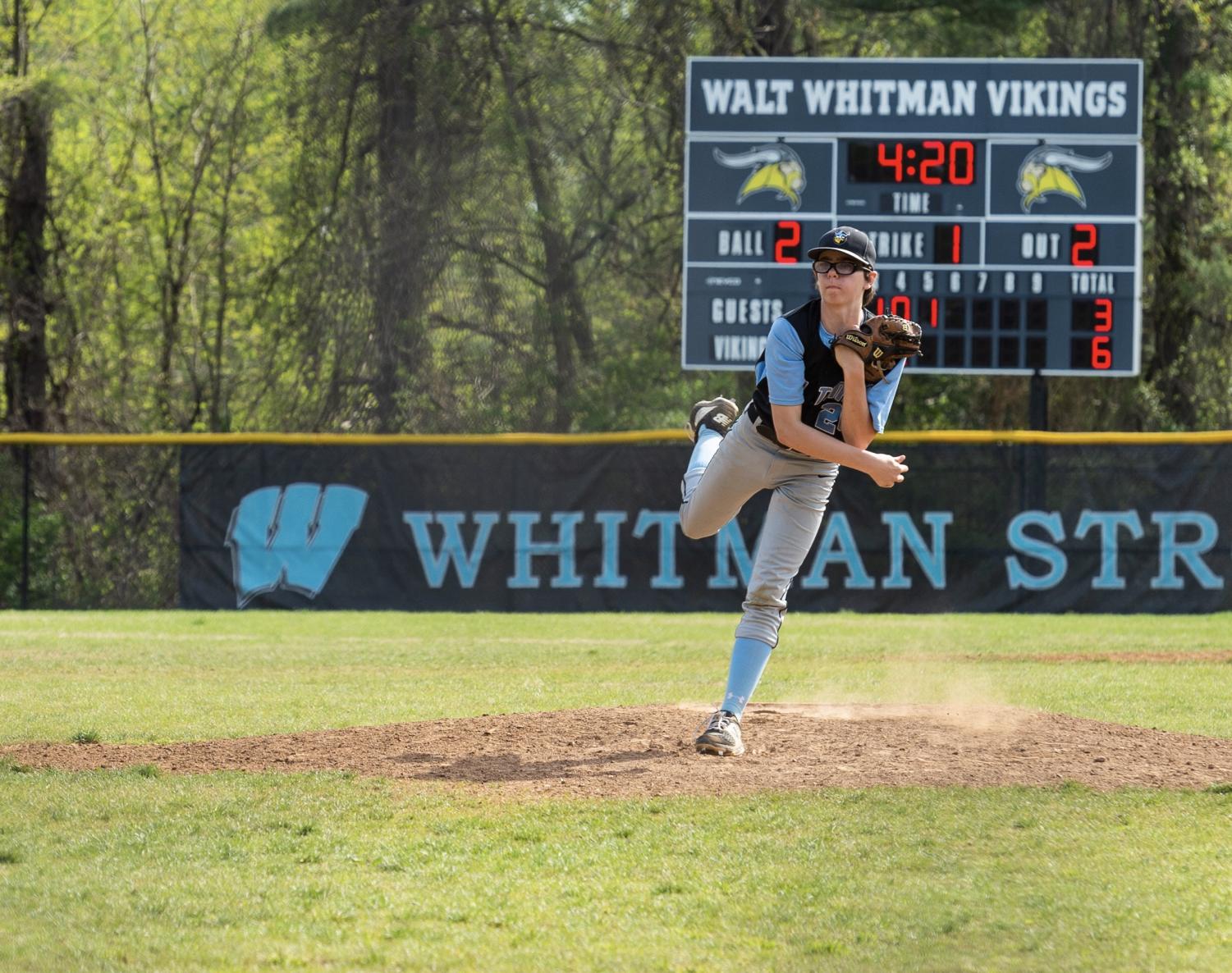
Why did you join the Black and White?
In order to become a better writer and to learn more about Journalism.
What's your favorite song?
Orange Julius


April 23, 2020
“I’m gonna keep this short and sweet. I don’t think we have a spot for you on the team this year.”
Those words from my former baseball coach signified that my days of playing Whitman baseball had likely come to an end — I had been cut from the varsity team.
For most people, this would have been a devastating event. However, contrary to how I thought I would react, I gained a sense of relief rather than a sense of despair.
I haven’t lost my passion for baseball. I still love the game, I still have an enthusiasm for playing and I’m still the kid who spent hours each day in elementary school hitting baseballs off of tees and throwing tennis balls against concrete walls. I’ve just realized that playing Whitman varsity baseball isn’t what I’m meant to do. Whenever I stood in the field or in the batter’s box, I would repeat to myself ‘Don’t screw up. Don’t screw up. Don’t screw up.’
Baseball became the biggest source of stress in my life my freshman year of high school. I was playing on the Bethesda Bards — a fall and summer league team that’s indirectly affiliated with Whitman and is coached by the Whitman coaches. I dreaded going to games and practices; I felt like I was under constant pressure to do everything right to get the coaches to like me and think I was a good player. I didn’t really feel like I was a part of the Whitman baseball community because I was afraid to play the game I loved. Whenever I stood in the field or in the batter’s box, I would repeat to myself “Don’t screw up. Don’t screw up. Don’t screw up.” The only place where I could remain calm was on the pitcher’s mound.
I never threw the ball very hard, but I felt like I was the most accurate pitcher on the team. I wouldn’t walk batters, and my occasional dominance on the mound helped me earn the nicknames “Strike-throwing McGuire” and “Iron McGuire.” I assumed that my accuracy and prowess would earn me a spot on the Whitman JV team. Unfortunately, I didn’t make the team freshman year. The coaches told me that I simply needed to throw harder if I wanted to be on the team.
Back then, I still wanted to be a part of Whitman baseball. I wanted to play for my school. I wanted to win a State Championship. The coach told me that if I wanted to play Whitman baseball the next year, I had to work extremely hard — and I was ready to give it my all. He recommended I go to Prime Performance, a sports facility in Gaithersburg that specializes in helping high school baseball players improve.
Prime Performance had a macho, testosterone-filled atmosphere. High school baseball players would be lifting weights, throwing weighted baseballs into nets and swinging bats as hard as they could — all while a mixture of rap, heavy metal and, oddly, yacht rock blasted from the radio. As a scrawny kid with glasses, I was very put off by the facility, but I would still go to Prime Performance twice a week for two and half hour sessions, and I soon began to dramatically improve my skills. When I first started at Prime, my average fastball velocity was about 61 miles per hour. Within a year, I was throwing 73 miles per hour (for non-baseball enthusiasts, this is a massive improvement).
My hard work ended up paying off: I made JV as a sophomore. Unfortunately, my dream soon turned to disillusion. Each day I would go to two and a half hour practices where, yet again, I was terrified to make a mistake. I was constantly afraid that the coaches would ask for my jersey and tell me not to come to practice, just because of one small mistake I made on the field. While the intense atmosphere might have been beneficial for some players, it wasn’t for me. I don’t view myself as a cut baseball player, but a liberated one.
To make matters worse, I lost the opportunity to pitch in most of our games for that season. While I was pitching in one of our first JV scrimmages, a line drive hit my hand, breaking my right pinky knuckle. I couldn’t pitch for four weeks, but I still went to all of our games and two and a half hour practices to show my support for the team.
When I finally recovered from my injury, I had the chance to pitch in two of the last three JV games of the season. In my first inning back from injury, I struck out all three batters I faced and the whole team started to cheer around me as I walked back to the dugout. For the first time, I truly felt like I had become a part of the Whitman baseball community.
As my sophomore year ended and junior year began, I still went to Prime Performance, but not as frequently as I would have liked, and I still played for the Bards. But my interests and priorities began to shift. I’m a member of the school’s debate team and I started going to more out-of-state debate tournaments. I started to write for The Black & White (oh yeah!) and I had to spend more time on school and getting ready to apply for college. I didn’t have the time to devote to baseball that I had my sophomore year, and I began to realize that I was okay with that.
As this year’s tryouts approached, I honestly didn’t know whether I would make the team or not. I was nervous; I certainly wanted to make the team, but in the back of my mind I thought, if I don’t make it, I’ll be fine. I didn’t make it. And I was fine.
Now, I don’t view myself as a cut baseball player, but a liberated one. I’m now free not only from mandatory, daily two hour practices, but also the biggest stressor in my life. I now also have the opportunity to play recreational baseball with my friends and allied softball at Whitman. I can still play the sport I love without the added stress.
When I was playing for Whitman, the coaches would always say, “We don’t want kids who play baseball on our team. We want baseball players.” Honestly, I think I’m fine with just being a kid who plays baseball.

jon • Nov 2, 2023 at 9:00 pm
i quit the team and told my parents i was cut.
Coleman • Oct 13, 2020 at 12:28 am
Well written, Jack. You provide an honest perspective on a major aspect of high school sports, and I enjoyed reading it.
Coleman
Massimo Flumian • Apr 25, 2020 at 9:41 pm
Nice article! I remember your mom told me and my family about this whole thing around a year or two ago when she visited. Didn’t sound like a great situation. This was fun to read though. Good job!
Matt Dickstein • Apr 25, 2020 at 12:51 pm
I think this article is completely unfair to Prime Performance. Tommy Johnson, the owner of Prime Performance, is very nice and has always been willing to work with everyone. I think the fact that someone was put off by people listening to music and lifting weight in a gym, means that Tommy wasn’t given a fair shot. Tommy and the other trainers at Prime Performance helped Jack reach his goal of making the high school team.
Kristen B. Caldwell • Apr 25, 2020 at 5:34 am
“Honestly, I think I’m fine with just being a kid who plays baseball.” Yes!
Great article, Jack, and fantastic approach to life. Reduce stressors where feasible; enjoy what you do. This is a helpful reminder for those of us well out of high school, too. Thank you for that.
Matt Dickstein • Apr 24, 2020 at 10:48 pm
As someone who went to prime performance a lot, I think this is very unfair to them. Tommy Johnson(Primes owner) has always made prime a very nurturing environment. He is very nice and always wants to work with everyone. Someone being put off by the music and the fact that people in a gym would lift weights means that Tommy wasn’t given a fair chance. Great read though. Your grammar is spot on.
Sydney Miller • Apr 24, 2020 at 10:28 pm
This is such an incredibly mature piece!! I went through nearly the same thing with Whitman Basketball, and I know exactly how you feel. However, it took me a long longer than you to get to a point where I could talk about it without being angry and bitter.
This is a great piece of writing and, speaking from experience, you’ve got a lot to be thankful for in life, and so many amazing opportunities that will come for you 🙂
Janine Werkman • Apr 24, 2020 at 7:37 pm
Thank you Jack! You’re a great kid and someone who will go far over the next few years. You’re also honest and not afraid to share the truth (and you can’t say that about everyone these days). You’ve not only had this important high school experience, but you’ve grown from it which is even more valuable. I can wait to see what the future holds for you. Best of luck Iron McGuire!
Lucy Murphy • Apr 24, 2020 at 11:12 am
What a fine statement! What great writing! How many young people handle such a situation so well. Proud of you Jack!
Meredith McGuire • Apr 23, 2020 at 9:21 pm
A well written testament to the benefits of being a well rounded athlete. Thanks for your honesty.